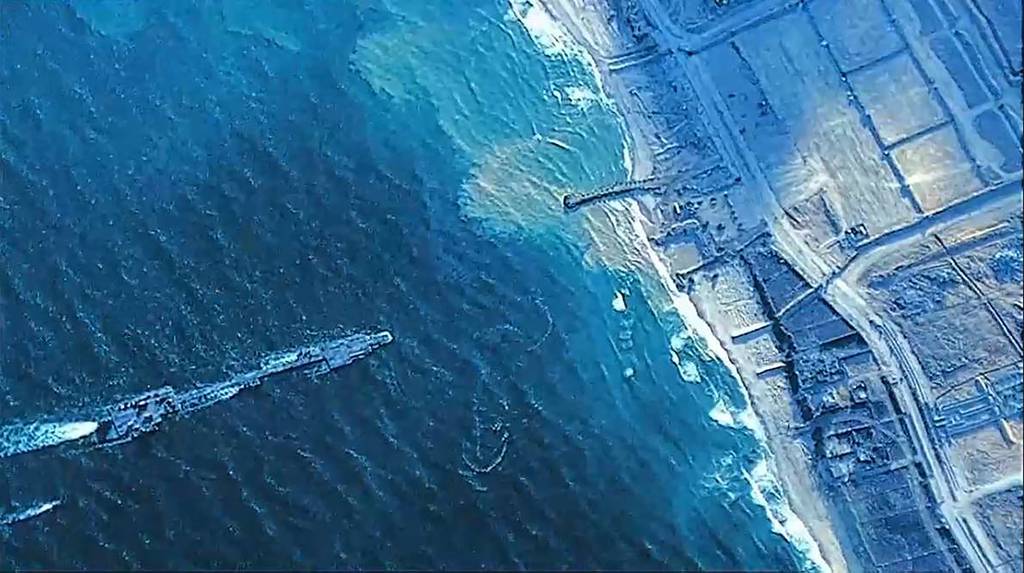
The House Appropriations Committee on Thursday advanced its fiscal 2025 defense spending bill while adding a provision that would eliminate the military’s makeshift pier off the coast of the Gaza Strip, which has struggled to deliver an adequate level of humanitarian aid to Palestinians facing famine-like conditions.
The committee voted 34-25 along party lines to send the $833 billion bill to the House floor with Democrats objecting to the provision that would shut down the pier, which will cost anywhere between $230 and $320 million according to Pentagon estimates.
The amendment from Rep. Andrew Clyde, R-Ga., bans the Defense Department from building or maintaining a pier or Joint-Logistics-Over-the-Shore capabilities “in the vicinity of Gaza.”
“The pier has been plagued by prolonged delays, hijacked humanitarian aid, additional costs and debilitating damages,” Clyde said ahead of the vote. “President [Joe] Biden’s Gaza pier has been a total failure. It’s not provided anywhere near the expected amount of aid to the Palestinians as promised by this administration.”
The Appropriations Committee adopted Clyde’s amendment by voice vote over objections from Democrats, who also opposed the final bill due to a series of socially conservative policy riders and a lack of Ukraine aid.
Rep. Betty McCollum of Minnesota, the top Democrat on the committee, noted that the Defense Department does not intend to continue its Gaza pier operation through FY25, which begins in October.
“A month ago, the head of the United Nations World Food Program announced that northern Gaza has entered a full-blown famine,” said McCollum. “This operation is only for a limited period of time and it ends in August when the weather and the seas will make it untenable to continue.”
Democrats on the Appropriations Committee also criticized a provision in the defense spending bill that bans funding for United Nations Relief and Works Agency for Palestine Refugees in the Near East. Another provision in the bill would prevent the president from withholding weapons deliveries to Israel and force the Pentagon to deliver the single shipment of roughly 3,500 air-to-ground munitions that Biden withheld in April.
Lawmakers on Wednesday also added two other amendments defunding the Gaza pier to the FY25 defense policy bill, separate legislation that the full House is expected to vote on Friday. The House adopted the provisions from Republican Reps. Nancy Mace of South Carolina and Warren Davidson of Ohio as part of a bipartisan package of amendments that both parties agreed to by voice vote.
The House on Wednesday added another amendment to the defense policy bill by voice vote that would bar the Defense Department from using funds to rebuild Gaza, though there’s no money allocated to do so in the defense spending bill. Lawmakers adopted the amendment from from Rep. Brian Mast, R-Fla., by voice vote over Democratic objections.
The House narrowly passed another Mast amendment 204-199 that would bar the Pentagon from evacuating Palestinian refugees to the United States, though the Defense Department has no plans to undertake such an operation.
Biden announced the pier to deliver aid to Gaza during his State of the Union address in March because of Israel’s ongoing restrictions on food, water, fuel and medicine deliveries through the land crossings. The pier sits on the coast at the end of the Israeli military’s Netzarim Corridor, which now divides the Gaza Strip in two.
Twenty aid agencies warned in May that deliveries from the pier have been inadequate to compensate for the low level of assistance through land crossings. And the UN World Food Program recently paused distribution of aid from the pier, citing safety concerns for its staff after rocket attacks on its warehouses.
Additionally, three U.S. troops sustained noncombat injuries in May while setting up the pier. Shortly thereafter, adverse weather conditions tore the pier apart and forced the military to repair it.
Author: Bryant Harris
Source: DefenseNews



